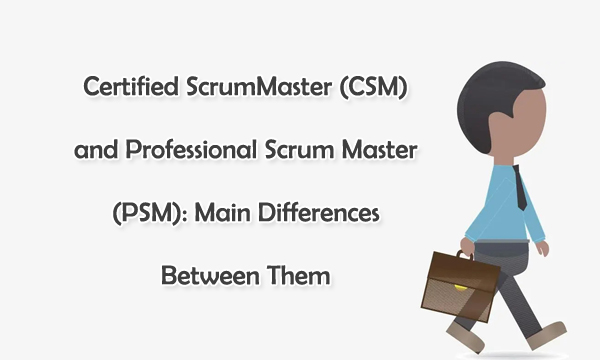Certified ScrumMaster (CSM) and Professional Scrum Master (PSM): Main Differences Between Them
Posted by:
Comments:
Post Date:
Certified ScrumMaster (CSM) and Professional Scrum Master (PSM) are distinct certifications, but many students remain unaware of their key differences. Consequently, these certifications are often confused with one another. To provide clarity for students and professionals alike, we will now elucidate the disparities between the Certified ScrumMaster (CSM) and the Professional Scrum Master (PSM).

Know Scrum First before Knowing the CSM and PSM
According to survey, IT professionals with certifications earn more per year than those without certifications. Additionally, certifications allow individuals to demonstrate their qualifications on their resumes and increase their chances of getting hired faster. As the demand for certified Scrum professionals continues to rise, organizations are actively seeking candidates familiar with the Agile and Scrum framework, principles, and processes.
Scrum is an Agile methodology that facilitates team collaboration and success in a dynamic development environment. Scrum teams are encouraged to operate transparently, self-organize to solve problems, and continuously improve through self-reflection. Prominent IT organizations and companies seek candidates with knowledge of Agile principles, Scrum framework, and its processes.
In the world of Agile and Scrum, two certifications stand out as valuable assets for professionals looking to enhance their Scrum careers: Certified ScrumMaster (CSM) and Professional Scrum Master (PSM). While these certifications may seem similar, it is essential to understand their differences to make an informed choice.
Certified ScrumMaster (CSM)
The Certified ScrumMaster (CSM) certification is one of the industry-recognized certifications that can significantly benefit your Scrum career. It is offered by the Scrum Alliance to make you learn the Scrum framework and gain an understanding of team accountabilities, events, and artifacts as well as how to guide your team to apply Scrum.
A scrum master is a vital member of the scrum team responsible for creating an efficient and productive working environment while guiding others to comprehend the values, principles, and practices of scrum. Scrum masters are known for their people-oriented approach, exceptional emotional intelligence, and passion for supporting the growth of team members. Whether you aspire to become a scrum master, are adopting scrum, or simply seek tools to enhance your agility, our Certified ScrumMaster (CSM) course is the ideal starting point.
Professional Scrum Master (PSM)
The Professional Scrum Master (PSM) certification is offered by Scrum.org. It enables individuals to demonstrate their knowledge and comprehension of the Scrum framework and its application. The Professional Scrum Master (PSM) certification is available in different levels: PSM I, PSM II, and PSM III. These levels allow professionals to showcase their proficiency and expertise in Scrum.
- Professional Scrum Master I (PSM I): It signifies a foundational level of Scrum mastery, validating understanding of the Scrum framework, Scrum Master responsibilities, and the application of Scrum.
- Professional Scrum Master II (PSM II): It validates the ability to apply the Scrum framework, support Scrum Teams, and solve complex real-world problems as a Scrum Master.
- Professional Scrum Master III (PSM III): It demonstrates a deep understanding of how to apply Scrum, Scrum practices, and the Scrum Values. PSM III assesses the capability as a Scrum Master in a variety of complex team and organizational scenarios. Earning the PSM III requires a high level of Scrum knowledge and extensive experience as a Scrum Master.
Main Differences Between CSM and PSM
- Certification Bodies: CSM is offered by the Scrum Alliance, while PSM is provided by Scrum.org. The two organizations have different approaches and criteria for certification.
- Focus and Depth: CSM focuses on introducing the fundamental concepts and practices of Scrum, making it an ideal starting point for beginners. PSM, on the other hand, offers a more comprehensive and in-depth assessment of Scrum knowledge and skills, catering to individuals with varying levels of experience.
- Assessment Method: CSM certification requires attending a two-day training course and passing an online exam. PSM certification involves passing an online assessment that tests practical knowledge and understanding of Scrum.
- Certification Levels: PSM offers multiple certification levels (PSM I, PSM II, PSM III), allowing professionals to demonstrate their growth and expertise in Scrum. CSM, however, is a single-level certification.
Conclusion
Both Certified ScrumMaster (CSM) and Professional Scrum Master (PSM) certifications have their unique features and benefits. The choice between the two depends on your level of experience, career goals, and preference for certification bodies. Regardless of the path you choose, obtaining a Scrum certification can significantly enhance your Scrum career and open doors to exciting opportunities in Agile development.
